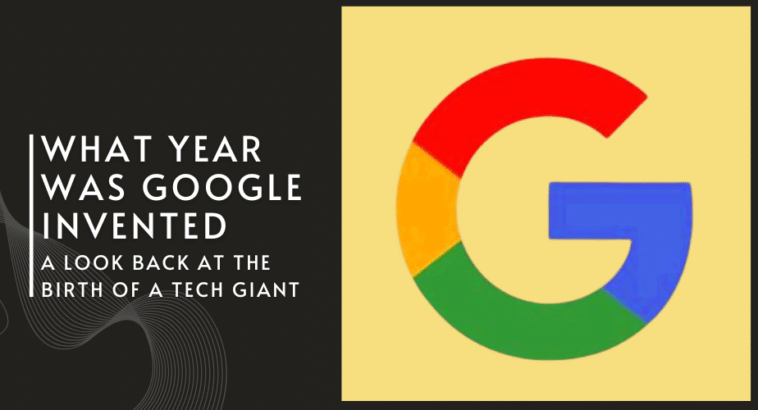The question what year was Google invented is more than just trivia—it’s a gateway to understanding one of the most influential technological shifts in modern history. In a world driven by search engines, digital ads, and cloud computing, Google’s birthdate marks the genesis of a global revolution.
Before we explore when Google was established, it’s important to recognize how the late ’90s laid the groundwork for digital giants. The dot-com boom, growing internet usage, and academic curiosity created fertile ground for Google’s inception.
The Founding Year: What Year Was Google Invented?
The Official Birth of Google in 1998
So, what year was Google invented? Google was officially founded on September 4, 1998. It emerged from a research project started by two Stanford PhD students, Larry Page and Sergey Brin, who wanted to improve how information was indexed and accessed online.
The First Steps Toward a Better Search Engine
Before becoming Google, the project was called “Backrub.” Its revolutionary PageRank algorithm analyzed backlinks to determine a webpage’s relevance—an innovation that forever changed web search.
From Dorm Room to Startup: When Was the Google Established?
Stanford Roots and a Garage Beginning
If you’re wondering what year was google invented, it officially became a company in 1998. Page and Brin incorporated Google while still students and famously moved into Susan Wojcicki’s Menlo Park garage—a modest beginning for a future tech empire.
The Role of Early Investors
One of Google’s earliest backers was Sun Microsystems co-founder Andy Bechtolsheim, who wrote a $100,000 check before the company was even formally set up. His confidence helped launch the vision behind when was the google established into a scalable business.
The Minds Behind Google: A Look at the Founders
Larry Page and Sergey Brin’s Academic Partnership
The founders of Google met at Stanford University and bonded over their shared passion for data organization and machine learning. Their academic synergy was crucial to building the PageRank algorithm and designing a better search experience.
Visionaries Who Changed the World
Understanding when was the google established means recognizing the foresight of its creators. Page and Brin were not just coders—they were visionaries who believed in accessible, universally useful information.
Google’s Mission and the Problem It Solved
The Search Problem in the ’90s
Before Google, search engines like AltaVista and Yahoo struggled with delivering relevant results. Google’s solution was smarter, faster, and more accurate, redefining the way people interacted with the web.
Organizing the World’s Information
Google’s mission “to organize the world’s information and make it universally accessible and useful” was baked into its DNA from day one. This mission shaped not only the history of Google but also the broader internet ecosystem.
Evolution of Google from 1998 Onward
Early Milestones and Growth
After Google was invented in 1998, it quickly scaled. By 2000, it became the default search engine for Yahoo. Its AdWords platform, launched in 2000, laid the foundation for its multi-billion-dollar advertising business.
Products Beyond Search
Though the original focus was search, Google expanded rapidly into email (Gmail, 2004), maps, video (YouTube acquisition in 2006), and mobile (Android). These steps trace the evolution of Google from a single-purpose engine to a tech conglomerate.
The Rise of Google as a Global Power
IPO and Corporate Expansion
In 2004, six years after Google was established, the company went public. Its IPO raised $1.67 billion, making it one of the largest tech IPOs of its time.
Becoming Alphabet Inc.
In 2015, Google restructured under the parent company Alphabet Inc., reflecting its broadening focus on everything from AI and cloud to self-driving cars and biotech—an incredible journey from when was the google established to modern-day innovation.
Cultural Impact and Legacy of Google
Changing the Way We Learn and Work
Google became a verb for searching online—a true sign of cultural saturation. It influenced how we learn, shop, communicate, and work. Its tools are embedded into daily life, from Google Docs to Google Meet.
The Ethical Responsibility of a Tech Giant
With great power comes great responsibility. As the origin of Google has morphed into global dominance, ethical questions about data privacy, misinformation, and monopolistic practices have emerged, adding complexity to its legacy.
The Role of Innovation in Google’s Early Success
PageRank: The Algorithm That Changed Everything
One of the primary reasons when was the google established holds such significance is because of the revolutionary PageRank algorithm. Unlike other search engines at the time, which relied heavily on keyword density, Google introduced a backlink-based ranking system. This approach prioritized credibility and relevance, ensuring users found the most trustworthy results. This was a game-changer in web indexing and became the cornerstone of Google’s meteoric rise.
Embracing Minimalist Design and Speed
While many competitors overloaded users with ads and portals, Google’s homepage was clean, fast, and functional. This simplicity wasn’t accidental—it was intentional. The founders wanted users to find what they needed without distraction. In understanding when was the Google established, it’s clear that from the start, performance and user experience were key priorities.
How Google Shaped the Future of Advertising
The Introduction of AdWords in 2000
Just two years after Google was invented in 1998, the company launched AdWords—a self-serve advertising platform that would become the financial backbone of the business. By enabling targeted, performance-based ads, Google revolutionized digital marketing. It gave advertisers a measurable ROI, setting the standard for paid search and making Google a household name in marketing circles.
The Rise of Data-Driven Marketing
AdWords and later Google Ads offered something previous platforms didn’t: insight. Businesses could now track conversions, optimize campaigns, and allocate budgets efficiently. This impact was massive. The year Google was established now marks the birth of a new era in advertising—one where analytics, bidding strategies, and search intent became central to marketing success.
Google’s Influence on the Modern Tech Landscape
Inspiring a Generation of Startups
Since Google was invented, it has served as a blueprint for thousands of startups worldwide. Its culture of innovation, emphasis on moonshot thinking, and belief in scalable infrastructure inspired companies like Facebook, Twitter, and even smaller SaaS businesses to dream big and move fast. Google proved that academic research could fuel billion-dollar companies.
Driving AI, Cloud, and Future Technologies
Today, Google is no longer just a search engine—it’s a pioneer in artificial intelligence, cloud computing, and machine learning. Products like Google Assistant, TensorFlow, and Google Cloud trace their roots back to the foundational thinking that began when Google was established. The innovations that sprang from that pivotal year continue to shape the trajectory of global tech today.
FAQs About Google’s Invention and History
Is Google Older Than Other Search Engines?
Although not the first search engine, Google’s technology quickly outpaced earlier players. It was launched after Yahoo (1994) and AltaVista (1995), but its superior algorithms made it the most effective.
What Was Google’s First Big Break?
Beyond academic circles, Google’s first big break was its partnership with Yahoo and the eventual adoption of AdWords, which monetized its search engine without disrupting user experience.
Conclusion: Why Knowing What Year Google Was Invented Still Matters
Reflecting on a Digital Milestone
Answering when was the google established—1998—is more than historical knowledge. It marks the beginning of a tech shift that would redefine the world.
The Journey from Idea to Global Titan
From a Stanford dorm room to a multinational powerhouse, Google’s story is a testament to innovation, risk-taking, and relentless execution.




